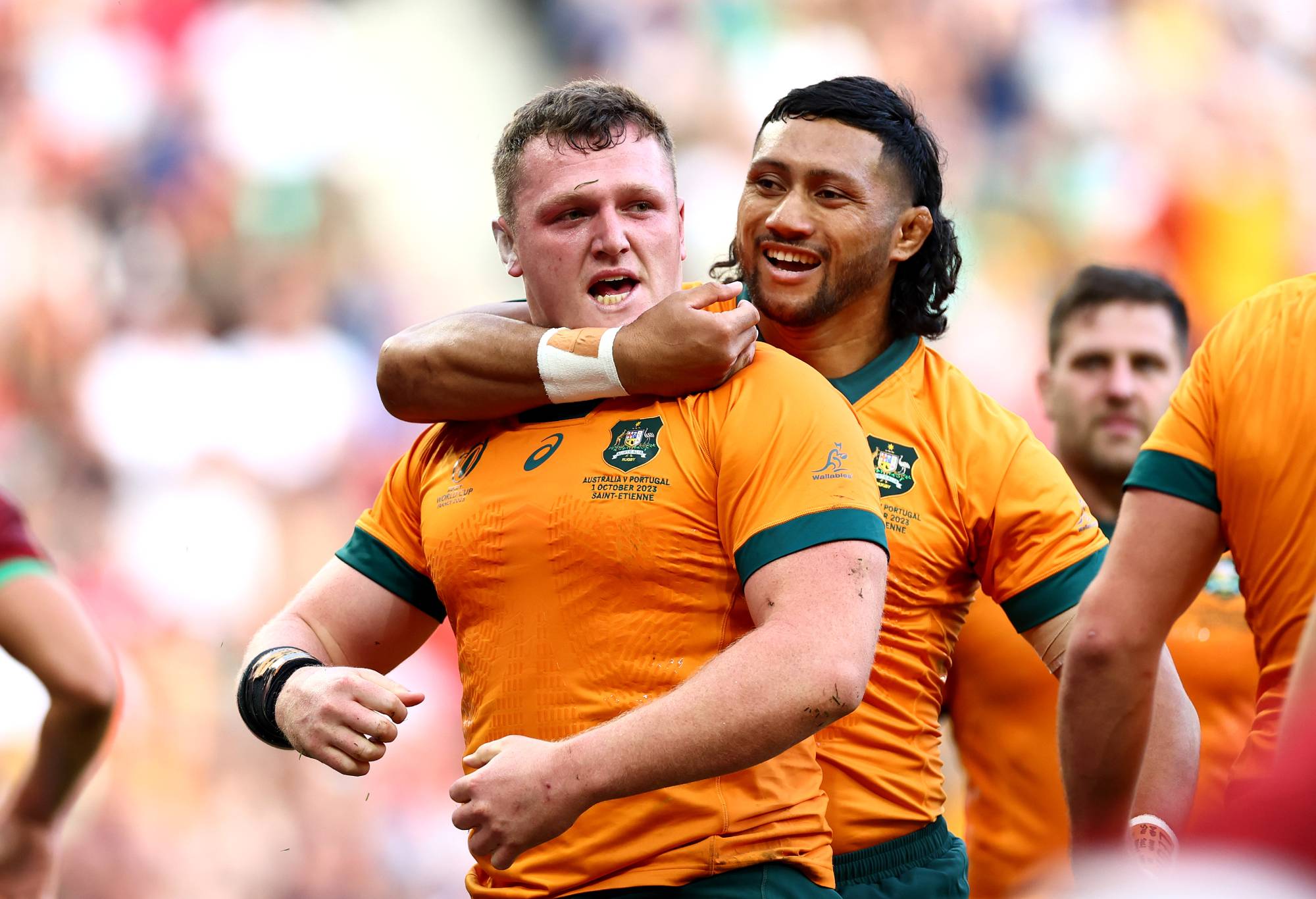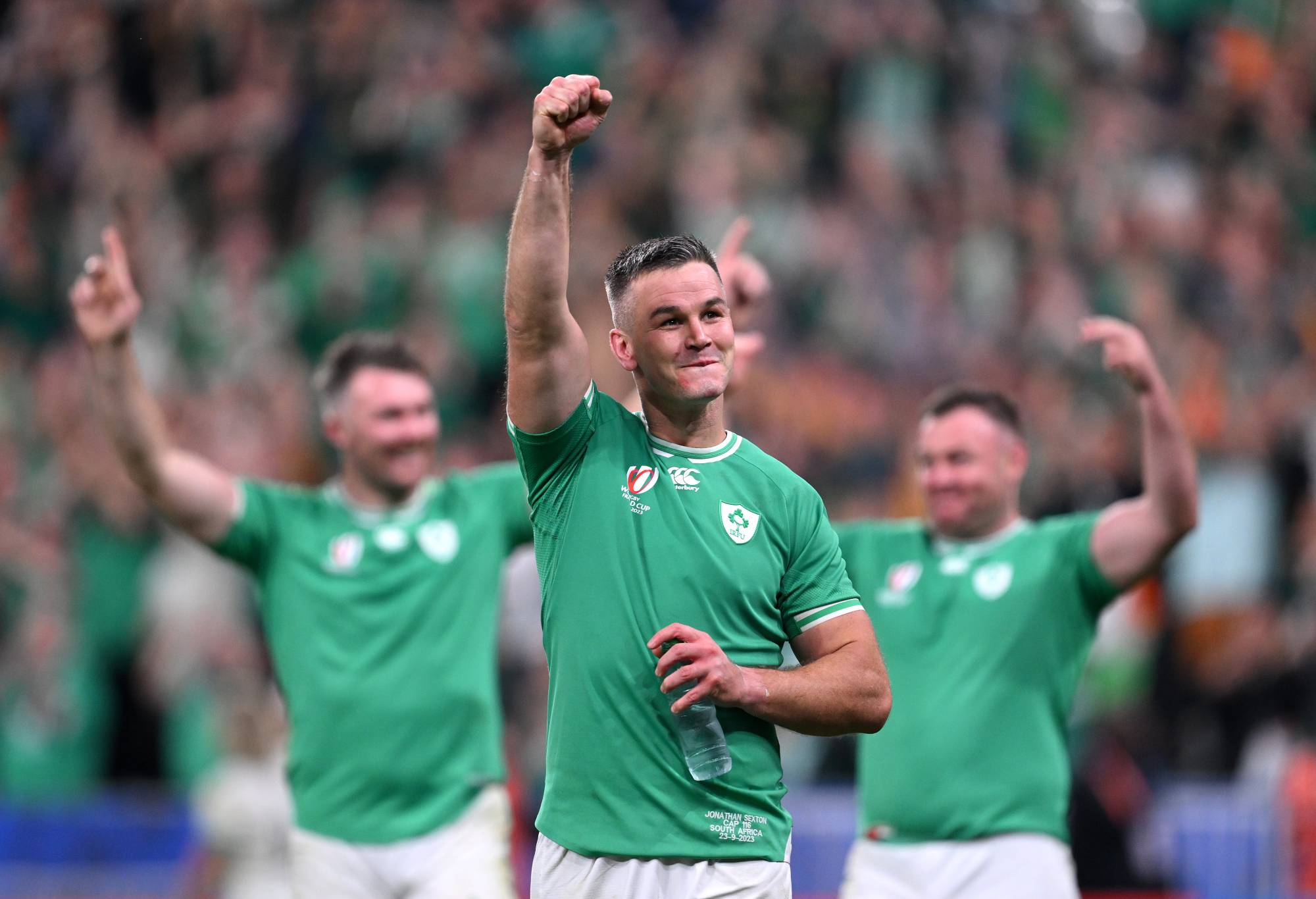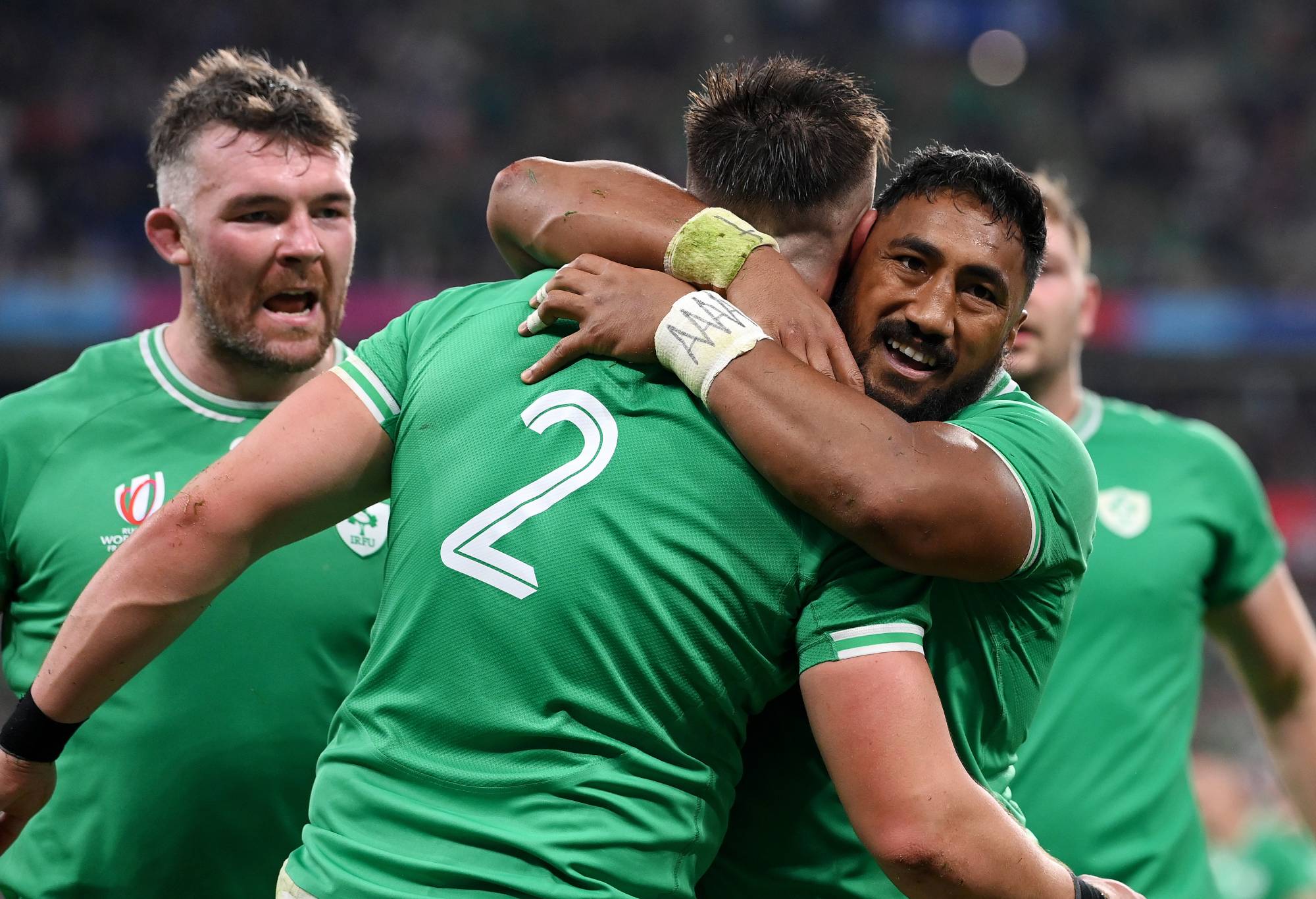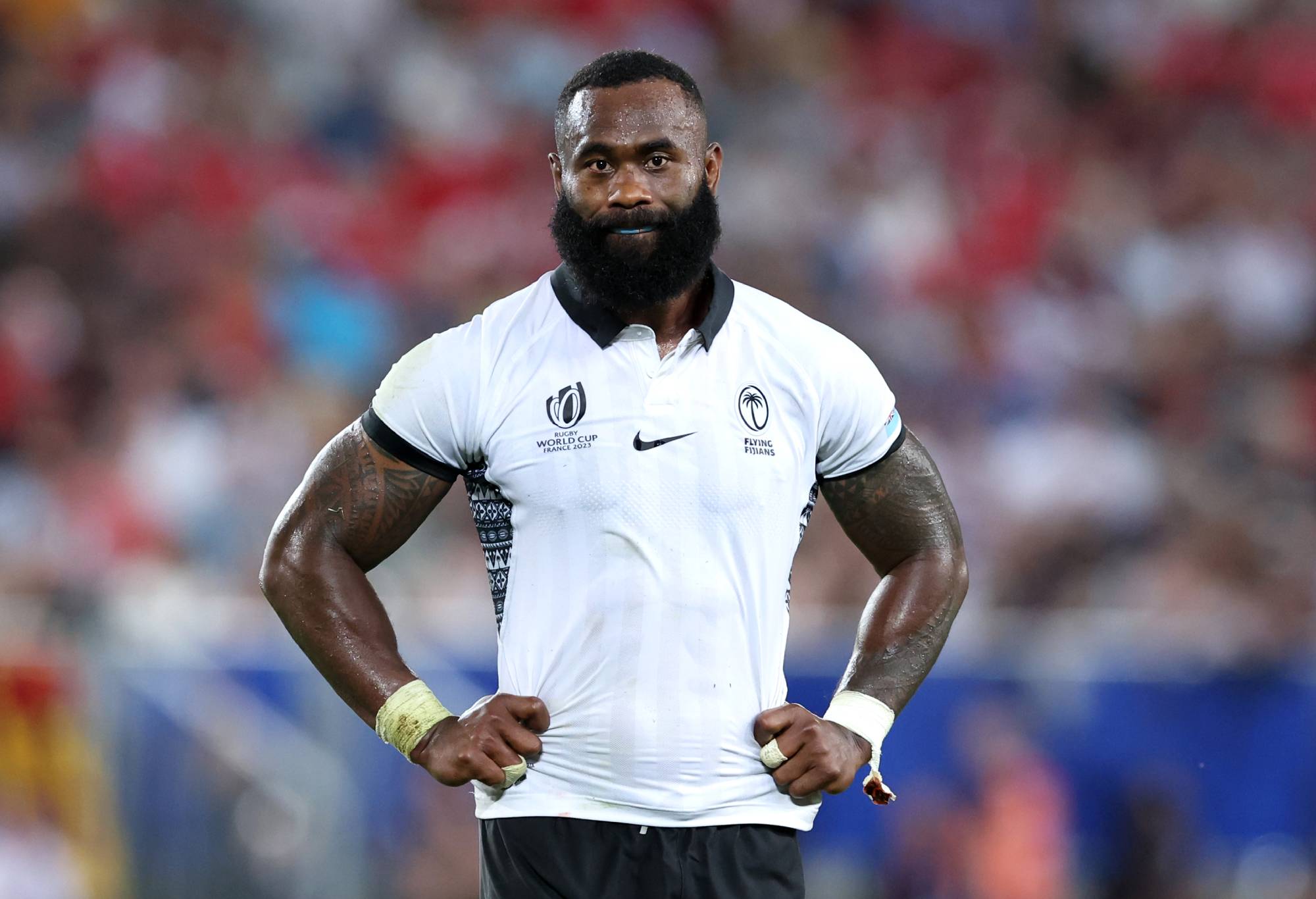The pools are drained of minnows. Only seven big fish remain; Fiji flew into finals with broken wings.
But before the ‘business end’ beckons and heavyweights collide, ending legends and spawning new mythologies, we must laud the performers in pool play. The only true upset waited till the very last.
We learnt about Portuguese hookers who dummy and clear, Chilean combovers, Namibian masochism, Romanian fortitude, and due to mismatches affording exotic selection patterns, how ‘big’ South Africa could have four tiny scrumhalves on the pitch at the same time, leading to one-second rucks and a poor referee donning earplugs.
The Wallaby coach needed no excuse for odd teamsheets. In the end, the backup tens of the final eight (including fellows like Handre Pollard, Gareth Anscombe, Damian McKenzie, Matthieu Jalibert, Jack Crowley, and George Ford, or is it Owen Farrell?) were a bit more experienced under pressure than either flyhalves Eddie Jones found it imperative to expose right now to help them four years from now.
I will heed the exemplary selecting practices of Warren Gatland in choosing a Team of the Pools.
First, form and ceiling outside these 40 matches is immaterial. Brodie Retallick is a lifetime legend, but Theo McFarland was a whale in his pool. Second, combination potential is cast aside: these are individual selections. Third, more than a cameo is required to make it into this team: Antoine Dupont’s 120 minutes is not enough. Finally, debate is intrinsic, integral, and inevitable. Dive into this pool.
Loosehead
Fiji and Wales had the most solid scrums in the shallow pools of C and D, just ahead of Japan and England. But Ireland and France led the way in the deep end of A and B. Amongst teams who did not make it through, Australia, Samoa, and Georgia were quite good.
Scrummaging is not the only remit of a number one, but it is a non-delegable duty. The lifting, carrying, mauling, tackling, rucking and snarling are all bonus points.
Gareth Thomas (Wales), Angus Bell (Australia), Andrew Porter (Ireland), Ox Nche (South Africa), Steven Kitshoff (South Africa), Guram Gogichashvili (Georgia, of course), and Eroni Mawi (Fiji) all had their moments, but we can eliminate the Georgian with the most Georgian name ever because he played less than a 100 minutes.
Kitshoff starts ahead of Nche, which trims the field, and hit almost 40 rucks with about 90% effect, but Mawi carried more time and more dominantly (30% of his 17 carries were dominant and 76% committed two tacklers or more), hitting almost rucks.70

Angus Bell. (Photo by Chris Hyde/Getty Images)
Bell played the most minutes of any loosehead in the competition (a staggering 272 minutes), made the gainline 53% of the time, and hit 43 rucks, albeit with far less effect than Kitshoff (70% ruck success). Porter has similar numbers to Bell in the pool but made two breakdown steals at critical moments. Both carried more and harder than Thomas.
We will go with Bell and Mawi mostly due to workload and having less support around them than the Irish and South African props.
Hooker
It is the era of the hooker.
Dan Sheehan is the modern prototype of an attacking two; Malcolm Marx the defensive archetype.
Sadly, both were limited by injury; Sheehan was shoehorned out of the stadium by Schoeman.
Meanwhile, robust Jamie George (England), hooker-flanker-hooker Deon Fourie (South Africa) who made six steals and the gainline 59% of the time, busy Codie Taylor (New Zealand), fullback-rake Mike Tadjer of Portugal (290 minutes played), Peato Mauvaka (France), hard-carrying Sama Malolo (Samoa) hit lineout jumpers and much more.
Argentina is led by a remarkable number two, who just gets things done.
One vaudeville lineout knocks Dave Porecki out, and amped up Dane Coles simply did not get enough minutes in the quality All Black hooker lineup.
Portugal’s cult hero hooker was far more than just a clearance kicker selling a dummy. Their lineout was the tidiest of the non-qualifiers (four percent better than Ireland’s in Sheehan’s absence).
However, Taylor was sensational in finding his jumpers at the middle and the back; a 98% success rate with only 32% to the front, compared to the French (92% and 40%, respectively).
George has been a mainstay in England’s march to the ‘easiest’ quarterfinal. He has played big minutes (226), hit 69 rucks with great effect, and made 34 tackles. Julian Montoya’s numbers are similar, but their head-to-head went the English way, hanging on in quiet desperation.
Mauvaka’s carrying nips Taylor and their head-to-head is also in the books.
But Tadjer had more to do and less to do it with, so we will go with Mauvaka and the hero in the upset: the new hooker sex symbol in Sheehan’s and Marx’s absence.
Tighthead
Big Ben Tameifuna of Tonga played 250 minutes, almost double that of Uini Atonio, France’s man mountain. Frans Malherbe was not on top of his game for the Springbok scrum, and Tadgh Furlong almost looked like Finlay Bealham was pushing him. This seems our easiest selection for starter: Big Ben. Backup will be Furlong for his pod-playmaking versatility which led to many of the flashy things out wide.
Locks
Theo McFarland of Samoa was a big bundle of ‘untackleableness.’ He and Cameron Woki of France have a way of making the game look simple, due to the size of their hands, their wild wingspan, and grace in the air. Both have superb numbers in big minutes for dominance in carry and tackle, as well as not shirking their ruck job. Wallaby captain Will Skelton would have had similar numbers at the ruck had he not been injured, but all teams have suffered big losses in personnel, and this is simply part of it.
Welshmen Adam Beard and Will Rowlands were impressive, but it is Rowlands (90% effective at over 50 rucks and big in the carry for 230 minutes) who rose.
Eben Etzebeth does more than more locks because he is a chaser on box kicks (and penalty goals that clang into the uprights) but picking him would be on history and ceiling more than play in this pool, which is the case for the All Black second row, too.
Amato Fakatava may have scored Japan’s best lock try ever, but he was not as effective at the ruck as the top players.
Tadgh Beirne is the big beating heart of Ireland’s campaign and his 288 minutes and immaculate 42 tackles with 92 ruck arrivals puts him into the team with McFarland (who just needs a coach like Paul O’Connell). Rowlands is the bench lock, and since the 6-2 is the new 5-3, Etzebeth joins him because he has the most dominant tackle percentage in the team making the most dominant tackles.
Blindside
Japan’s Michael Leitch did what Michael Leitch does, Bok backrower Pieter-Steph du Toit has only one speed, Uruguay’s Manuel Ardao went 294 minutes uphill, Charles Ollivon seems like he is playing a French rugby star in a film noir with full makeup and a beard which never deviates in perfection, Dan Lydiate of Wales was a ruck monster, and Courtney Lawes seemed to will England back into contention.
But there is only one six so far and it is the Munster Mouth, the Cock from Cork: a ‘shit CJ Stander’ but the one having the last laugh over and over: Peter ‘Effin’ O’Mahony. He is not missing tackles or lineouts or rucks (57 at 94% effectiveness) or opportunities to sledge in his 267 off-colour minutes, and has stepped the first tackler 22% of the time. Not bad for an old gardener.
Openside
It may seem unfair to World Player of the Year Josh van der Flier who has done nothing wrong, but Levani Botia has almost singlehandedly willed Fiji into the knockouts, committing two more unlucky tacklers into contact with him on 68% of his 28 sickening carries, and hitting over 85 rucks at 93% success. His six turnovers turned the tide of his team’s matches.
Wales’ Jac Morgan and Tommy Reffell split time at seven and ‘Captain Jack’ is a bit of a hybrid like Siya Kolisi, but the young Osprey still got in 240 minutes and 50 tackles and is just behind Botia, and slots into our bench for his versatility.
Honourable mention to Portugal’s amazing Nicolas Martins.
No. 8
Greg Alldritt has been in imperious form and needs to be to edge Caelan Doris. I will go with Doris purely because Ireland played against better opposition, and Doris’ 268 minutes had more action (32 carries with 50% gainline, 2 try involvements, 50 attack rucks at 90% effect) and 50 tackles with 4 steals, and harder graft than Alldritt’s 160 minutes. This may come back to haunt Ireland (they looked spent at the end of the Scotland destruction).
If Taulupe Faletau had not broken his arm, he would also be in contention.
Rob Valetini (311 minutes) was among the best of the Wallabies, but he was not as good at the ruck at these top number eights.
Halfback
Cobus Reinach for the Boks cannot stop scoring (his evasion stats top the charts). Cam Roigard was similar but has the better pass. His mentor Aaron Smith’s smooth delivery from the deck is still top shelf.
If Frank Lomani had Smith’s arc, who knows what would be?
Dupont’s facial injury is well documented and the blasé nature of pushing a young man back into a car crash with Springboks is textbook hypocrisy in sport, but he cannot take a spot on this team due to it.
Bok sparkplug Faf de Klerk lost his duel with part-time wing Jamison Gibson-Park of Ireland, but both have looked very sharp.
Santiago Arata of Uruguay and Samuel Marques of Portugal (296 minutes) both impressed from the non-qualifiers with the latter appearing to be the best scrumhalf on the pitch in his games.
We will reward the Irish nine for his scoop and smash and snipe; the old Kiwi talker on the bench.
Flyhalf
English general George Ford took an early lead in this category, dropping the Pumas like flies, but then the old feral debate caught him again. The sooner England coaches drop Owen Farrell and Freddie Steward and let Ford and Marcus Smith run the attack with a proper midfield, the sooner they will rise.
Still, it is Ford’s spot to lose by my reckoning.
Who are the challengers?
Lima Sopoaga of Samoa, Jalibert of France, Gareth Anscombe of Wales, and Jonathan Sexton of Ireland.
Anscombe appeals due to the pressure of his involvements and how he had to win matches, but how can anyone (except Gatland for the Lions) leave the Irish quarterback out? He plays as if he is a gridiron QB calling plays, audibles, and stunts. A coach on the field, as Rassie Erasmus dreams about.
Due to our fashionable 6-2 split, this is a straight up shootout between Sexton and Ford. They have similar numbers but let us avoid esotericism and take Sexton for his far superior defence.

PARIS, FRANCE – SEPTEMBER 23: Johnny Sexton of Ireland celebrates victory after defeating South Africa during the Rugby World Cup France 2023 match between South Africa and Ireland at Stade de France on September 23, 2023 in Paris, France. (Photo by Laurence Griffiths/Getty Images)
Inside Centre
Bundee Aki, the Irish Basteraud, has been all over the place; a bit of a Botia type. His dominance in contact (61 carries; 62% dominant) and number of try involvements in the full house of 320 minutes is difficult to match.
Damian de Allende actually has even better performance numbers for the Boks (evasion, tackler commitment, gainline) but split time with Andre Esterhuizen, so his minutes are half of Aki’s.
Slippery Nick Tompkins found holes where none appeared for Wales. Grieving Josua Tuisova made holes out of tacklers as he committed two tacklers over half the time and smashed opponents in the tackle.
But Aki has been at his best.

PARIS, FRANCE – OCTOBER 07: Dan Sheehan of Ireland celebrates scoring his team’s fifth try with teammates Peter O’Mahony and Bundee Aki during the Rugby World Cup France 2023 match between Ireland and Scotland at Stade de France on October 07, 2023 in Paris, France. (Photo by Stu Forster/Getty Images)
Outside Centre
Garry Ringrose ran downhill for Ireland for 261 pool minutes, but one cannot help but wonder how much was his creation and how much was from Messrs. Sexton and Aki. Also, he misses too many tackles.
Shredded Jesse Kriel filled in ably for injured talisman Lukhanyo Am of South Africa, with better numbers on both sides of the ball, and also seemed to win his duel with Ringrose.
Waisea Nayacalevu led Fiji until he seemed to break down at the last.

BORDEAUX, FRANCE – SEPTEMBER 10: Semi Radradra of Fiji looks dejected at full-time following the Rugby World Cup France 2023 match between Wales and Fiji at Nouveau Stade de Bordeaux on September 10, 2023 in Bordeaux, France. (Photo by Alex Livesey/Getty Images)
George North played the most immaculately at thirteen, as has undefined position man Anton Leinert-Brown (back to form).
Honourable mention to Pedro Bettencourt of Portugal for both flair and starch. Also, Len Ikitau would have been nice to see when it mattered for the Wallabies.
Santiago Chocobares’ break against Japan almost got him in.
This is the most difficult position to select, but it comes down to Nayacalevu, Kriel, North, and Gael Fickou, the quiet man in the French backline who does not make mistakes.
In the name of versatility, I will go with Kriel. The sound you hear is the earthquakes in Durban and Dublin.
Wings
Damian Penaud looks like a dork from chemistry class who suddenly shot up a foot in varsity and has not grown into his body or his hair. But he has jersey number 14 and is a big problem to contain. Mack Hansen is so lucky it is not luck. His defence is remarkable in light of his lack of bulk. His attack is instinct.
Will Jordan’s upcoming duel with one-eyed James Lowe will be box office: who can stop Jordan?
Honourable mention to Raffaele Storti of Portugal who plays like a wolf and Kurt-Lee Arendse who simply did not get as many minutes, due to the Boks’ platoon system for nines and fourteens.
At number 11, Duhan van der Merwe was great until he met Ireland’s lack of Celtic collusion.
Davit Niniashvili played across the back three and had his moments.
Semi Radradra had the most painful drop of the tournament.
Louis Rees-Zammit has swag and a strut, but I was most impressed by Mark Telea of the All Blacks who simply tops every chart on impact: his try involvement per touch, his carry effectiveness (bringing 3 tacklers in higher than anyone else; evading 52% of all tackle attempts) and sheer inability to be turned over. He is getting better with every Test.
Fullback
Damian Willemse has every claim to this jersey, but he needs to be the utility man, backing up Sexton. No, here we find the invisible man with invisible feet, Hugo Keenan. He is the only Hugo in the Cup, has played every Irish minute, looks a bit like a zombie at the end, and has been the try-assist king, as well as the scorer. He does not seem to ever be surprised by any kick.
Pool A’s Thomas Ramos and Beauden Barrett may have more to say in the knockouts but Pool B’s fifteen rule here.
Honourable mention to Portugal’s Nuno Sousa Guedes and Japan’s brilliant Lomano Lemeki as well.
Team of the Pools
1. Angus Bell (Australia)
2. Peato Mauvaka (France)
3. Ben Tameifuna (Tonga)
4. Theo McFarland (Samoa)
5. Tadgh Beirne (Ireland)
6. Peter O’Mahony (Ireland)
7. Levani Botia (Fiji)
8. Caelan Doris (Ireland)
9. Jamison Gibson-Park (Ireland)
10. Johnny Sexton (Ireland)
11. Mark Telea (New Zealand)
12. Bundee Aki (Ireland)
13. Jesse Kriel (South Africa)
14. Damian Penaud (France)
15. Hugo Keenan (Ireland)
Replacements
16. Mike Tadjer (Portugal)
17. Eroni Mawi (Fiji)
18. Tadgh Furlong (Ireland)
19. Will Rowlands (Wales)
20. Eben Etzebeth (South Africa)
21. Jac Morgan (Wales)
22. Aaron Smith (New Zealand)
23. Damian Willemse (South Africa)
































































































